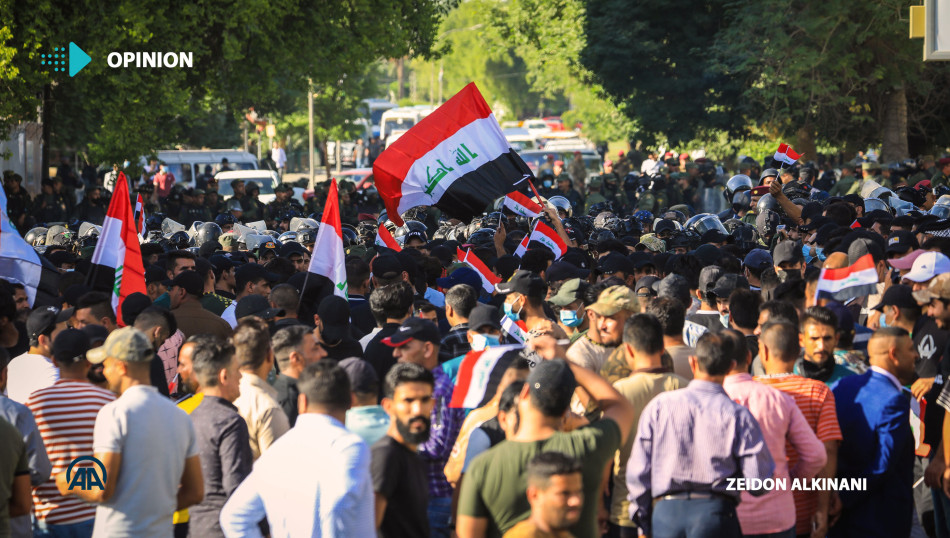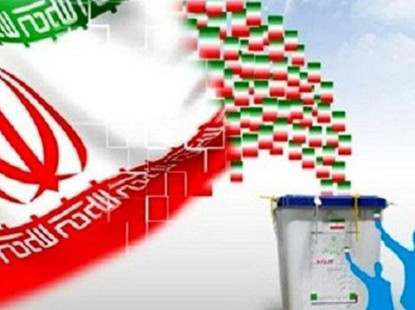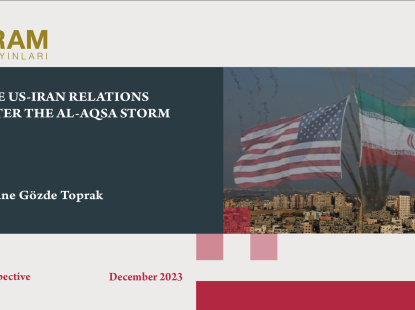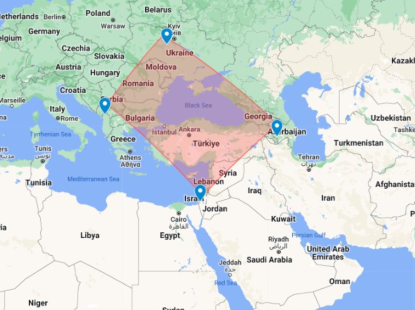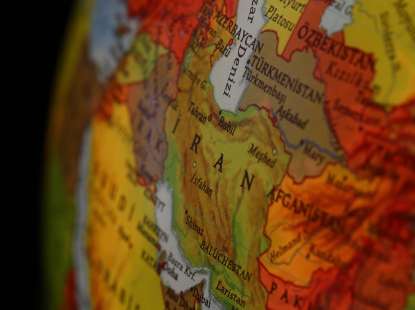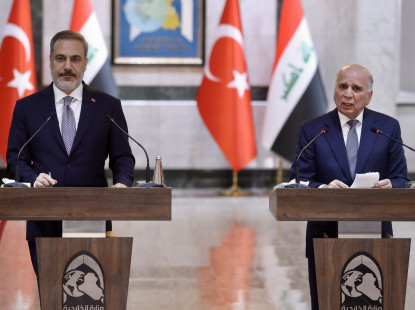Tishreen’s Interaction With Iraq’s Early Elections (2021)
Iraq has just experienced its first ‘early elections’ as a result of a public rebellion that rejected the political system since October 2019 – known as the Tishreen (October) protest movement and uprising. The protests called for an end to corruption, ethnic-sectarian quota-based distribution of power known as the muhasasa, limitations of freedom of speech by impunity, and a drastic constitutional reform. The protesters wanted an overhaul and not a reform of the system.
In contrast to many other analyses on the elections results, voter turnout, and the possible coalition-formations, this article will look at how Tishreen’s various forces views and engages with the early elections through the ‘boycott’ element, since it is the reason why it is proceeding from the first place. Tishreen is no longer a moment that passed but a permanent political identity that will permanently play a vital role in reshaping the post-2003 Iraqi political scene.
Prior to discussing what the early elections mean for Tishreen, we must briefly mention some of the protest movement’s outcomes. To start with, the governmental ‘compensations’, which in return are considered as achievements by the Tishreen uprising’s continuous resilience in pressuring the government for change. While some are considered symbolic achievements, others were more strategic. The first symbolic achievement was the announced resignation of Prime Minister Adil Abdul Mahdi on November 30, 2019, just weeks following the outbreak of Tishreen protests. It was this resignation that led to the formation of a new government under the leadership of Prime Minister Mustafa al-Kadhimi in May 2020. Despite being formed by the same agreements of the same political class and muhasasa system – it reflected the people’s ability to push for change. For those reasons, al-Kadhimi’s government was rejected by most Tishreen forces and groups, yet it did offer early elections, which took place on October 10, 2021. Moreover, Tishreen’s pressure led to the government to present a minor electoral reform which led to breaking down 18 electoral districts into 83, in an attempt to diversify the district and that way, voters will have a more open representation and the ability to vote directly for independent candidates rather than wasting their votes on powerful coalitions.
How do Tishreen’s various forces engage with the early elections? Now how we aim to utilize this rebellious Tishreen moment to achieve those objectives is where we witness the implications of the differences among the Tishreen protest movement.
The main divisions on the political participation were as either: to boycott the elections and refuse the political system’s attempt to re-legitimize itself through early elections, or to participate and form political parties that would elect themselves in the early elections and allegedly represent and defend the demands of Iraqis as per Tishreen.
The boycott camp questions the purpose of participating in elections in a system without the ability to criticize the government or even to criticize political parties and militias without being subject to violence and having to live with living standards of rising unemployment and poor public services. An efficient and established democracy should not end at elections, or else it will only be an 'electoral democracy'. Now many would disagree with that point and argue that Iraq is a young democracy and that today's Iraq, from a democratic perspective and particularly when it comes to the limited freedom of expression, is still better than pre-2003 Iraq, but then it arises the question that is Iraq under Saddam Hussein the benchmark we are comparing with? Is it efficient or applicable to compare an almost two-decades-old democracy with a horrible dictatorship?
“The boycotters do not consider these elections as a solution, nor will it bring new or different faces from the previous parliament,” says Azhar Al-Rubaie, an Iraqi activist and journalist from Basra. Al-Rubaie further explains how the initial demands of the boycotters were focused on eliminating the dominance of the traditional political parties over Iraqi politics, the reconsideration of some laws related to the elections, and an end to the impunity which encourages armed wings affiliated with political parties to change the election results by force of arms and influence if it does not work for in their favor, “therefore, it does not regret the boycott, because they expect and believe that nothing will change as long as the same blocs rule Iraq”.
Therefore, there are low chances of winning. The indicators as per observers and protesters, especially with the prominent boycott means protest movement activists will only gain a small and ineffectual number of seats in parliament – and this assumption also considers their lack of interest groups, funding, media support, regional support, and more. This argument, however, could be countered by the minor victory in votes by the Imtidad Movement which also emerges out of Tishreen, and it will be briefly mentioned during the ‘participation’ assessment below.
The main goal to overhaul the political system; participating in the early elections is a legitimization of the same political class – it will not guarantee, if not at all, an overhaul of the political system that would create a new interim government consisted of technocratic candidates with no association or influence from the traditional political parties and particularly the ones with armed wings. This mainly leads to the fact that any elections with the same political class and agreements will eventually form a government that will distribute positions based on the ethnic-sectarian quota known as the muhasasa system which mainly assigns a Shia to the Prime Minister, a Sunni to the Speaker of Parliament, and a Kurd for the Presidency, with of course similar pre-agreed appointments to various ministries with minor exchanges between every new term. In addition, there will be an end to the muhasasa at the core of Tishreen’s aims and objectives, therefore, participating in these elections under the same muhasasa is seen as a re-legitimization of the system.
The boycott camp is also challenged by questions on the lack of a clear roadmap to alternative actions. However, that criticism is responded to by the establishment of a political opposition that took place on August 10 by Al-Bayt Al-Watani (a political party that emerged out of Tishreen). The declared political opposition gathered various groups with a similar vision towards building a future beyond the muhasasa and reforming the democratic process.
Al-Bayt Al-Watani’s move is a new challenge faced by the political system. Political opposition was mainly seen on the ground through protesting and social activism, and briefly through parliament with failed attempts to achieve an effective number of seats in parliament nor the ability to gain ministerial positions without the overshadowing influence of traditional political parties. This newly established political opposition presents a more established and politicized social entity that aims to hold the government accountable as an active civil society.
Ahmed Al-Naseri, an Iraqi activist informs İRAM that he expects major support from Al-Bayt Al-Watani to Imtidad and says that the voice of opposition within the future parliament must mainly focus on how to mobilize the opposition on the streets in order to ensure an efficient pressure on the larger and traditional political blocs in parliament.
On the other hand, the participation camp, mainly led by Imtidad Movement and Nazil Akhath Haqi Democracy Movement were clear in their early stages about the importance of participating in elections and ensuring an honest representation of the people and the protesters. They believe that change requires patience and time and can only happen from within the system, in consideration of the costly sacrifices and attempts to change it through disobedient and peaceful rebellion.
Al-Rubaie further explains to İRAM how the optimism behind Imtidad’s electoral achievement may not meet the required level due to the boycotters’ hesitance or mistrust towards anyone participating in the early elections, however, he adds that their "boycotters’" stance might change if their parliamentary presence remains as a voice of opposition along with the other independent candidates.
Al-Naseri interestingly added, “if the Sadrists only managed to get less than one million votes as per many sources, then a unified voice by Imtidad, Al-Bayt Al-Watani, and other Tishreen forces will certainly manage to get a higher number”.
“Most boycotters, including Al-Bayt Al-Watani, celebrated and congratulated Imtidad’s minor victory”, says Ali Hussein, a political activist from Basra, while emphasizing on the the great potential of a collective force between Imtidad and Al-Bayt Al-Watani in the upcoming provincial councils’ elections.
Many would consider Tishreen’s diverse approach towards the early election as an alarming indicator of fragmentation. That could lead to a very simplistic judgment. In fact, It is very natural for a nationwide upheaval to carry with it so many clashing and differing ideologies. As long as the fundamental demand or demands are met on common grounds and in the case of Tishreen’s fundamental values, it is the end to the muhasasa system, end to militia violence, and an en evident political and economic reform that would reflect upon the country's public services such as electricity, healthcare, and education. Tishreen is not a single entity for us to expect it to be centralized in one direction, it is a wave of new political and social attitudes led by youth to determine the future of the youth – where some would find themselves in parliament and others in civil society platforms. From an optimistic point of view, this could be considered as a positive expansion in all directions rather than a weak fragmentation.
